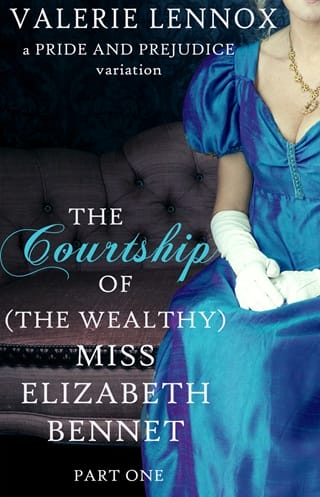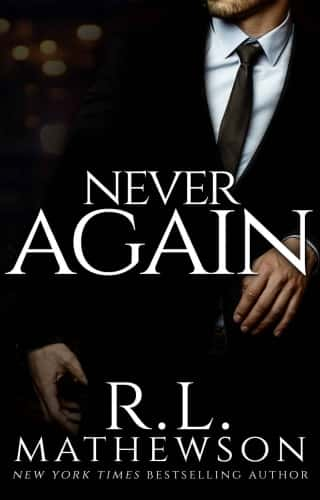Chapter Twenty-Seven
Louisa allowed herself no time for moping. When she returned, she knew she had at best two days before Knight chased her to the ground, and by then, she needed to be prepared.
Perhaps she may not retrieve the letters and painting by force, but she could compel him to release them into her care. Then she would destroy both, and her life could continue along the path she had set out on all those years ago.
The first thing she did was summon her man of business to the house. He came with alacrity, Louisa being a valued and highly paying patron, and she sat with him in her drawing room, the curtains open to reveal the day.
Mr Upperton, a quiet gentleman of indeterminable age, sat opposite her with his hands loosely clasped in his lap and his sharp eyes on her. "If I may venture to say, ma'am, this is very early for a call."
"Yes," she said, not bothering to explain herself. "I require you to find someone for me."
"Oh?"
"Arabella Knight was her name, but she married, probably five to ten years ago, and since left the country. I suspect for the East or West Indies, although I cannot be certain. Find her. There will likely be a newspaper announcement of their marriage."
The only sign of surprise on Mr Upperton's face was the slow way he blinked. "What information would you like?"
"Merely her direction at present. I may in time wish to extract her from her current precarious position, but for now I only need to know her name and where she is currently residing." She flicked a speck of dust from her gloves. "Hire as many men as you require to do the job."
"Of course, my lady. When do you need this information by?"
Louisa smiled, though there was no humour in it. "Yesterday."
He inclined his head. "I see."
"See to it, if you please."
"Yes, ma'am. Is there anything else you require?"
"Yes, as it happens." She handed him a slip of paper with Knight's address written on it. "Keep a watch on this house, and when its gentleman lodger returns, be so good as to inform me."
Mr Upperton accepted the paper and tucked it into his waistcoat pocket. He was a man of resources and a great deal of reserve, which was why she had chosen him. Her past made it likely that some of her dealings would be less than savoury, and so she had hired a man who would not bat an eye at her more outlandish requests. "I shall see to it," he said in a colourless voice. "Does my lady have any other requests?"
There was a knock at the door. "Your carriage, my lady," Avery said. If he'd felt any surprise at her sudden arrival home, he had not shown it, merely asking if there was anything he could do for her.
She would never cease to be grateful for the loyalty of her retainers.
"Thank you, Avery," she said, rising. "That's everything, Mr Upperton. Avery will see you out."
Avery held the door open. "This way, sir."
Mr Upperton bowed and walked out of the room, and Louisa glanced at the window. Once again, she was struck by the thought that if she was particularly lucky, she might see Henry striding along the pavement underneath.
Of course, she did not. He was bound for the country, and she had refused him.
In her weaker moments, such as the one where he had left the carriage, she had almost cracked. If he had not been the son of an earl, she would have given all her freedom up for a life with him.
Absurd how she could have thrown away all her vows so quickly. For a man who had broken her heart once already. But although the bitterness she harboured had not gone fully, the worst of it had been and gone without her noticing.
Avery entered the room again. "Your carriage, my lady?"
"Ah yes, of course." She gave a grim smile and did her best to put thoughts of Henry from her mind. "Thomas Hyatt."
Thomas Hyatt lived in the unfashionable neighbourhood of Bayswater—not nearly as exclusive as her own address in Arlington Street—but the house was large enough despite that. Evidently Thomas Hyatt had been doing well for himself.
Any other time, she would be glad.
"Good evening," Louisa said, stepping inside the house when the maid opened the door. "Please tell Mr Hyatt that Lady Louisa Bolton, formerly Miss Louisa Picard, is here to see him. He will receive me."
The maid bobbed an awkward curtsy, and after escorting her to a cool, stale parlour, disappeared. Louisa tilted her head up, examining the paintings on the wall. There were many of them, giving her reason to suspect this was the room where he courted new business.
There was no denying he truly was a master.
Not too much time passed before there was a movement by the door, and Thomas Hyatt appeared before her, older than she had last seen him, age a map across his face. Shadows pooled in the hollows under his cheeks. As a painter, he was flawless; as a man, she was old enough now to know he had flaws aplenty.
"Lady Bolton," he said, and by the roughness of his voice, she knew he understood what she was doing here.
"Out of respect for the things you have given me, I will be civil." Her voice was cool, but there was a lake of hurt that lay behind it. Betrayal that she hadn't allowed herself to feel until now, but faced with him, the feeling swelled. He had guided her as a child, taught her how to hold a brush and commit the things she saw to a canvas. He taught her how to convey her world into a medium that others could see and interact with, and he had never once made her feel as though she was lesser for choosing oils despite being a lady.
Even when she had been accepted into the Summer Exhibition with Domestic Bliss , he had not critiqued her choice of subject, merely the faults with her perspective and colour choice.
But now, when faced with an obstacle, he had rather toss her to the metaphorical wolves than stand up in her defence.
She understood that her father had paid him; she understood that he had not helped her as a matter of real interest but of financial gain. He was her tutor and she was his student, and she knew he had many students.
But this was art, and art had principles.
He bowed his head. "Let me explain, if you will, Lady Bolton."
"I would like very much to hear it." She crossed the room to the chair and sat herself in it, folding her hands neatly on her lap. "And then I would like you to listen."
He chose to remain standing, his face turned to the floor rather than to her, as he spoke. "You may remember that my grandfather is Italian. Shortly after you married, I left for Italy, and—"
She waved a hand, cutting him off. The gesture was imperious, she knew, but it had been a long day and her heart was aching and she had no time for social niceties. "I understand your motivations. Continue."
"Well." He coughed and took the seat opposite. His shoulders were frail, she noticed. Perhaps he was in his sixties now. He certainly had not been young when he had begun his tutorage. "I remained there for a long time ignorant of your activities, or in truth the state of the English art world in general. I worked for several prominent . . ." He caught her expression and stalled, licking his lips in a nervous gesture. "Yes, well, I suppose it hardly matters what I did when I was away. Suffice to say I had plenty to occupy me. A few months ago, a letter arrived from a Mr Knight, asking if I was your tutor and whether you employed a particular style. The note surprised me, but I was happy to convey the peculiarities of your style as I remembered them. I confirmed they were distinctive enough that I believed, as your tutor, I could recognise them." The corner of his mouth curled in a weary yet pleased smile.
She refused to be gratified that he remembered the quirks of her paintings. "Did he say anything else?"
"He requested that I return to England and vouch to the Prince Regent that some paintings are yours. At first, I refused—the journey is long and I was occupied with painting—" He coughed again. "But, you see, my youngest daughter remained in England. She was at school here—"
"Yes, I'm aware."
"Mr Knight made it plain that . . ." His voice trailed away, but Louisa knew enough of Knight's methods by now to fill in everything unsaid. No doubt he had threatened Hyatt's daughter—with ruin, perhaps, or seduction, or some mix of the two—and that had been enough incentive to bring the old painter back to England.
She could hardly blame him. But he had not once thought to inform her of the situation.
Or perhaps he was unaware of the power she now held.
"And so you were willing to destroy my future in order to secure hers," she said.
He winced. "She's my daughter."
"Were you unaware of the fortune Lord Bolton left me on his death?"
By the look on his face, he had been. When he had left for Italy, Lord Bolton had been alive and well. "You might at any time have alerted me. Mr Knight is not a man of means." She rose, expecting him to rise to meet her. But Mr Hyatt was not Henry; he did not match her challenge with his own steel. This was an expert in oil and nothing else. A man used to bowing to the whims of the aristocracy.
Pity swamped her, hard and fast, unexpected in its potency.
Yes, she had a right to her anger, but he was surviving the only way he knew how, and she could not fault him too much for that.
She sat. "This is how it will be," she said, gentling her tone. "If you are called upon, you will tell the Prince Regent nothing conclusive. You will give me your daughter's direction and I will write to her and to the school, warning them against admitting Mr Knight. He will have no way to access her; they will not wish to incur the wrath of a countess, I assure you."
Relief broke out like sweat across the man's face, and he bowed his head, revealing a bald patch shining through his hair. "Yes, my lady."
"And if Mr Knight threatens you again, bid him to think of his sister and apply to me. All will be well, I assure you." She gave a grim smile and rose. He did too, looking at her the way he always had when he had given her lessons. For a moment, she was a child of seventeen again, young and eager, filled with respect for a man who had so much talent, and desperate for his approval.
She shook her head and dispelled the image. She was a woman now, desperate for no one's approval but her own, and she would not be beholden to another person for the rest of her days.
When she returned home, she brought out her canvas and began to paint.
 Fullepub
Fullepub 



